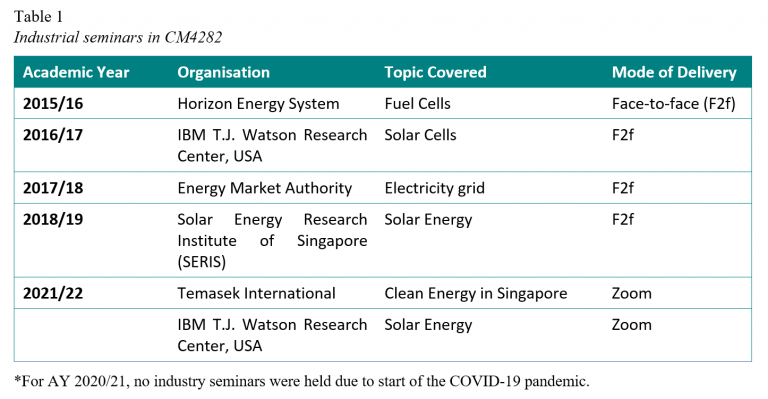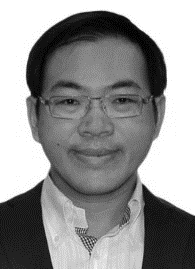FOO Maw Lin
Department of Chemistry, Faculty of Science (FoS)
Maw Lin talks about industry seminars and their usefulness in providing students insights into how the course content can be applied in real-world settings. He also talks about how the seminars were delivered virtually during the pandemic and students’ responses to this format.

Foo M. L. (2022, April 22). Using industry seminars in upper-level modules for connecting classroom lessons and real-world applications. Teaching Connections. https://blog.nus.edu.sg/teachingconnections/2022/04/21/using-industry-seminars-in-upper-level-modules-for-connecting-classroom-lessons-and-real-world-applications/
Introduction
For the Year 4 chemistry module CM4282 “Energy Resources”, industry seminars have been an integral part of the course since its inception. By asking relevant industry experts to share insights about their work and industry trends, it will enable senior students to place their earlier years of university learning into context, and establish connections between classroom-acquired theoretical knowledge and real-world applications in the industry. This write-up briefly describes these industry seminars and also highlights the recent use of Zoom and flipped classrooms in enhancing the delivery of these industry seminars.
Conducting Industry Seminars in CM4282
During the industry seminars, leading energy experts from different organisations (local and international) were invited to share insights such as the latest advances in their company/industry as well as the skills required to enter and succeed in their company/industry. This was immediately followed by a question-and-answer (Q&A) session. Table 1 gives details of the industry seminars held in CM4282 from AY2015/16 to AY2021/22.

For the industry seminars conducted in AY2021/22, there were two key differences from previous iterations:
- The seminars were carried out via Zoom instead of face-to-face (F2f). Conducting the talks on Zoom increased the ease and accessibility of reaching local and even overseas external speakers, since physical travel to NUS is no longer needed.
- The seminars were held during the lecture slots (2 hours) instead of the tutorial (1 hour) slots, to allow adequate time for the speakers and subsequent Q&A segments.
Meanwhile, despite the change in seminar duration [as illustrated in point (ii)], the course syllabus continued on track as class materials originally scheduled for the lecture slots, which were taken up by the industry seminar, were covered via the flipped classroom approach instead. The respective e-lectures were uploaded onto LumiNUS and students had to watch them outside of classroom hours before attempting a graded multiple-choice (MCQ) quiz during the same week.
Instructor’s Notes
To maximise students’ learning, the instructor should contact the selected speakers early and discuss course-related matters with them, such as possible seminar topics as well as giving the speakers a brief overview of relevant topics in the module syllabus. Such discussions enable the speaker to understand the audience better and helps them to structure the seminar, especially ensuring coverage of essential technical content. During the Q&A session, the instructor should be ready with some relevant questions to start the ball rolling. Lastly, the speaker’s permission should be obtained for dissemination of recordings and lecture notes due to intellectual property concerns.
Student Feedback
For AY2021/22, the students were surveyed using the Survey function in LumiNUS. The survey findings indicated that the industry seminars were generally well received by students. Out of the 35 students surveyed, 97% think the industry seminars are a good way to observe classroom knowledge being applied in the real world. 66% of students surveyed prefer the seminars to be held in Zoom over the F2f format. 57% of students surveyed did not mind learning from the flipped classroom approach to free up class time for two industry seminars. This result suggests the validity of applying the flipped classroom approach to free up classroom time for the industry seminars.
Meanwhile, the overarching theme for the qualitative feedback received is that the industry seminars reflect the fact that the course content is relevant and applicable to the real world, especially in the local context. This is important as relevance has been closely linked to intrinsic motivation for learning in the pedagogical literature (Kember, 2008). Meanwhile, some students also highlighted that they preferred F2f instead of Zoom as the former enabled them to have a better discussion and networking experience with the speakers. One way to address such feedback is to alternate between Zoom and F2f sessions for different seminars in future iterations of CM4282, giving students the opportunity to experience the benefits of both formats.
Conclusions
With the advent and social acceptance of Zoom as a medium for conducting such talks, it is relatively easy to infuse senior-level modules with industry relevance by inviting both local and overseas industry experts to give industry seminars via Zoom. From the survey responses of students in CM4282, this is a classroom activity with good pedagogical value. In addition, it is also beneficial for the instructor to be exposed to the latest trends and developments in the industry. Fellow educators are encouraged to give this a try in their respective courses.
 |
FOO Maw Lin is a lecturer from the Department of Chemistry at the Faculty of Science (FoS), and has previously taught chemistry and materials science in the United States, Canada, and Japan. He is passionate about using game-, group-, and problem-based learning to enhance critical thinking in science students. Maw Lin can be reached at chmfml@nus.edu.sg. |
Acknowledgements
The author would like to thank all industry experts who have participated in CM4282’s industry seminar programme since its inception.
Reference
Kember, D., Ho, A., & Hong, C. (2008). The importance of establishing relevance in motivating student learning. Active learning in Higher Education, 9(3), 249–263. http://dx.doi.org/10.1177/1469787408095849

